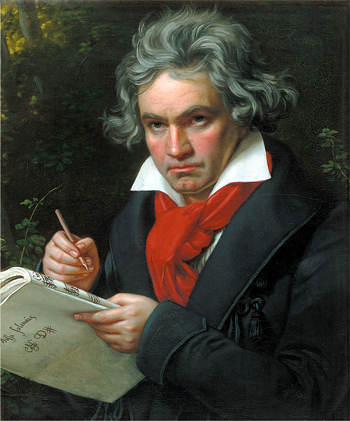Ludwig van Beethoven, the triumph over suffering
“I love the truth more than anything,” Beethoven wrote to Goethe 200 years ago. Of course, Goethe loved the truth as well, but in a rather glacial manner, at a distance. Beethoven’s love was passionate, urgent, unsettling; truth, to him, seems to have had something to do with God, with love itself, with justice and beauty. Certainly, these make up the elements of his music – sublime, sincere, and beautiful, beyond words.

Although his music is beautiful, Ludwig van Beethoven was not. His friends say that he was short, swarthy, solidly built, clumsy, and awkward, with a rather homely, pock-marked face. They also kindly mention his beautiful mane of hair and the brilliant whiteness of his teeth.
Beethoven was the son of a drunkard, knew abuse and privation from his earliest years, but was nurtured by people of discernment and influence who, early on, recognized his great gifts. Although he had a volatile temperament, there is evidence throughout his life of a generous heart.
At the age of 29, on the threshold of success, he wrote his brother: “If conditions improve, my art will be used only in the service of the poor.” He never married, although he was almost always in love, and friendships were difficult for him, invariably broken off from time to time and later put right.
The great cross he had to bear was assigned early, in his 26th year, as he began to lose his hearing and rapidly became stone deaf. His famous “Heiligenstadt Testament,” written in 1802, tells of despair and thoughts of suicide, but it also tells of a great miracle, a great revelation, the discovery of his unshakable strength, and a certainty that “it is impossible to leave the world until I have brought forth all that I feel is within me.”
What was within him, his sublime music, was not written for classrooms, or scholars, or critics. It was written for the human heart and precludes either analysis or criticism. When considering some of his masterpieces in sequence, however, one finds an overview of his growth, not only as a man of genius but simply as a man. It reveals the expansion of a great soul, its steady course through youthful hopes, struggles, and victories to the final, wordless conversations with the Being to whom he prayed his entire life. His character and love for truth as well as the particularities of the composing process are revealed in a nice artistic movie titled “Copying Beethoven”.
The song that begins “How glorious is nature, illumined before me” was composed when Beethoven was 19. It is the song of a young spirit, fearless and, with good reason, full of the highest hopes. One senses the same atmosphere in the chamber music of that early time, a reflection of the world in which he moved – the last decades of the 18th century, the age of enlightenment of symmetry, logic, and clarity.
The following years were the years of Romanticism, where music became less abstract and more personal. Forms were less rigid. The dramatic climate rose, and emotions, especially the emotions of the composer himself, took a prominent place in the music he produced. The “Choral Fantasy for Piano, Orchestra and Chorus” comes to mind. It is an exuberant hymn to nature and to the possibility of mankind’s achieving peace and happiness in this life. It is remarkable that such a work was written during the onset of his deafness.
Beethoven’s only opera, “Fidelio” was also conceived in this period, establishing a scenario that becomes familiar in many subsequent works, especially in the slow movements of his string quartets and piano sonatas: strife, an appeal to God for help, and an inevitable resolution with its attendant joy. The greatest examples of this, incomparable in their power, are to be found in the last act of “Fidelio,” and the “Ode to Joy” that closes the Ninth Symphony.
yogaesoteric
December 19, 2020
